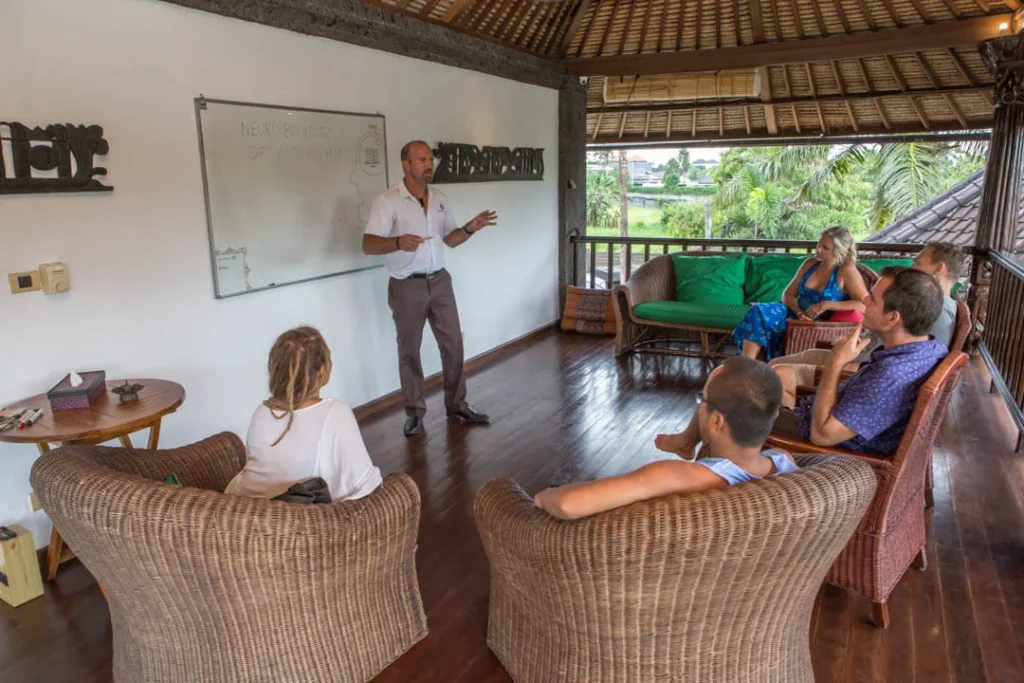Gambling Addiction Treatment
In the intricate dance of risk and reward, gambling can swiftly transform from a leisurely pastime to a consuming compulsion. What starts as an occasional thrill can gradually spiral into an all-consuming struggle, affecting every facet of life.
At Sivana Bali, we recognise the profound impact such an addiction can have, not just on the individual but also on families and communities. Our dedicated team is here to help you navigate the complexities of this overwhelming journey and guide those ensnared toward a brighter, gamble-free horizon.

What is a Gambling Addiction?
A gambling addiction, medically referred to as ‘Gambling Disorder,’ is a persistent and recurring problematic pattern of behaviour associated with gambling activities. Unlike casual gamblers who can walk away after a few rounds, a problem gambler feels a compelling urge to continue gambling, often in more significant amounts, irrespective of any negative consequences.
How Does a Gambling Problem Start?
Problem gambling often begins as a seemingly harmless and enjoyable activity. However, for some individuals, the thrill of the gamble can become much more than just occasional fun. Various triggers, such as personal stress, financial pressures, or significant life changes, can escalate the frequency and intensity of betting.
Over time, the uncontrollable urge to gamble may intensify, especially in the face of losses, with the individual believing that the next bet might be the one that will win. This cycle can lead to developing a gambling addiction, where the drive to play isn’t just about winning money but an emotional need to continue the behaviour despite detrimental outcomes.
Gambling Addiction Treatment at Sivana Bali
Gambling may start as a harmless bet but can quickly spiral into a destructive gambling disorder, impacting mental health, relationships, and overall well-being. At Sivana Bali, we deeply understand the complex challenges of compulsive gambling.

Personalised Gambling Addiction Programmes
Problem gambling affects everyone differently, which is why our tailored treatment programmes address individual needs, helping each gambler regain control and stop gambling for good. Our renowned treatment facility offers comprehensive treatment programmes designed to tackle the root causes of this destructive behaviour.

A Supportive Environment for Lasting Change
For those struggling with a gambling problem, breaking free from unhealthy gambling behaviour requires an environment that removes temptation and fosters recovery. Our rehab for gambling addiction ensures that individuals are immersed in a nurturing space, free from external triggers and distractions, allowing for meaningful transformation and sustained progress.

Cognitive Behavioural Therapy (CBT) for Gambling Addiction
Cognitive Behavioural Therapy (CBT) is a proven method that helps individuals rewire their thought processes, reducing the urge to gamble and reinforcing healthier decision-making. A cornerstone of our treatment is CBT, a powerful tool in breaking free from harmful cycles. Our skilled therapists guide individuals in recognising, challenging, and altering destructive thought patterns that drive their gambling urges.

Group Therapy
Therapy in a group setting provides an essential lifeline for those facing problem gambling, offering shared experiences and mutual support in overcoming bad habits. Group therapy plays a vital role in our treatment programme, offering a supportive space for individuals to share their experiences, gain valuable insights, and build connections with others on a similar journey.

Confidential Support and Self-Help Resources
For those seeking help, our confidential helpline and self-help resources provide immediate counsel, guidance, and support to begin the journey to recovery. Whether you’re looking for professional therapy or exploring self-help strategies, we are here to assist you in breaking free from this problematic cycle.
How To Control Problem Gambling
Other than going to a gambling rehabilitation centre, there are several things that a person can do if their gambling behaviour were ever to become a problem. Some of the ways people with a gambling addiction may control their behaviour include:
Surrendering Financial Control
To gamble, a person needs to have access to money. By surrendering financial control over to someone else, someone who won’t release funds for gambling, a problem gambler is forced to stop gambling entirely since they’ve got nothing with which to place wagers. This method can be a powerful barrier against impulse betting and can prevent financial losses from spiraling out of control.
Self-Exclusion Programmes
There are a number of self-exclusion programmes wherein a person voluntarily commits to not gambling for an agreed-upon period. During this self-exclusion phase, an individual will not be able to gamble in a casino and many online gambling platforms. This structured commitment can provide a crucial break, allowing individuals to seek therapy and rebuild healthier habits.
Set Content Limits
A method that can curb some gambling behaviour is to block online gambling platforms. People can restrict their gambling by setting content limits on a home Wi-Fi network. Many gamblers find that reducing their exposure to gambling-related content helps weaken the urge to gamble over time. Taking small steps like this can make a big difference in regaining control and finding freedom from addiction.
Getting Professional Help
Someone with a gambling addiction can seek professional help through a rehab centre. Individual therapy can help people address the root cause of their bad habits, and support groups can offer encouragement and accountability. Cognitive Behavioural Therapy (CBT) is particularly effective in helping clients reframe their thoughts and develop healthier coping mechanisms.
Distraction
Another method that people with gambling problems can use to restrict their behaviour is to distract themselves. By finding another, less destructive hobby, a person can occupy their time with something that doesn’t result in the consequences of gambling. Engaging in exercise, creative pursuits, or volunteering can provide a fulfilling alternative to gambling.
How Are Substance Use and Compulsive Gambling Related?
There’s an intricate relationship between gambling addiction and substance abuse. For many individuals, the exhilaration of gambling can act as a euphoric experience similar to the high derived from drugs or alcohol. This overlap isn’t merely coincidental. Studies have shown that individuals with a gambling disorder often grapple with co-occurring issues such as depression or anxiety, which may lead them to self-medicate with substances.
Dual Diagnosis Treatment at Sivana Bali
At Sivana Bali, we recognise the complexities of dual diagnosis cases. The consequences can be magnified when gambling addiction and substance misuse intertwine. That’s why our gambling treatment plans are tailored to address both conditions simultaneously. Focusing on these disorders’ root causes and interconnected nature, we offer a holistic rehab experience to treat the symptoms and build a strong foundation for long-term recovery.
Contact Us
At Sivana Bali, we’re here to help you navigate the path to recovery so you can regain control over your life. If you or a loved one is struggling, don’t hesitate. Reach out to us today and begin the transformative journey towards a brighter, balanced future.
FAQs About Gambling Addiction Treatment
What are the effects of gambling addiction?
A gambling addiction can impact finances, relationships, and mental health, leading to anxiety, depression, and isolation. Over time, problem gambling may escalate, causing severe financial hardship and strained personal connections. Seeking help early can prevent further harm.
Why do people keep gambling despite the negative consequences?
The urge to gamble is driven by a psychological compulsion, often reinforced by the hope of winning back losses. Many individuals feel trapped in a cycle of chasing bets, even when they know it’s harming their lives.
Can gambling addiction affect mental health?
Yes, gambling addiction is closely linked to anxiety, depression, and feelings of guilt or shame. Financial loss and secrecy can worsen mental well-being, making professional support essential.
How does gambling addiction impact relationships?
Problem gambling can cause trust issues, emotional distance, and financial strain within families and friendships. Loved ones may feel helpless or betrayed, making open conversations and support crucial for recovery.
